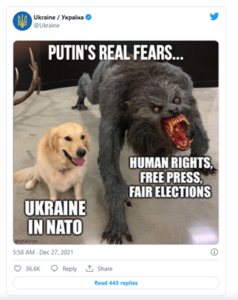A Cold, Dark Winter: Crisis, Uncertainty, Ukraine
This month’s intended topic was taxes. We know that the best laid plans will hit one obstacle or another along the way. But having a plan – and sticking to it – is one of the best countermeasures to uncertainty. And so this week began with an escalating crisis in eastern Europe. With a 24-hour news cycle and social media reporting, we will see events unfold from more sources than ever before, in real time.
Watching as the attack on Ukraine began, I was reminded of my first trip overseas, in the 1980s before the fall of the Berlin Wall. One of my most vivid memories came from the London Underground, waiting for a train. A poster across the tracks, arching up onto the curved wall of the cavernous tunnel, showed a group of people sleeping in a subway station. The caption in huge letters at the very top read “It’s so quiet now you can almost hear a bomb drop.” It still gives me chills.
The poster was a nod to British history, to the Blitz of 1940, when Londoners and other British urbanites endured an eight-month bombing campaign by the Germans. Then the war was not yet worldwide, and news of it came by newspaper and radio.
This week we saw Ukrainians in Kharvkiv, Kyiv and other urban centers pack into subway stations as refuge from the Russian attack on their country that began on Thursday morning. Some images looked hauntingly familiar, but they were carried in vivid color, nearly instantaneously.
Today is Sunday, February 27, 2022. The world changes, and in some ways it remains the same. This unsettling past week illustrates the entrenchment of a new geopolitical order with long-term repercussions. Yesterday European Union President Ursula von der Leyen announced that for the first time ever, the EU will finance the purchase and delivery of weapons and equipment to another country, to Ukraine. Further, the EU has cut off its air space to all Russian aircraft, and will ban “the Kremlin’s media machine” by developing tools to thwart misinformation. The full statement can be found Here. We start with near-term impacts on financial markets.
MARKETS IN THE NEAR-TERM
By mid-week last week, U.S. stock markets were in correction territory. A market correction is a decline of 10% from a peak. Thursday morning opened with tech stocks nearing bear market levels, meaning a decline of 20% or more from market highs. By the close of the trading day in the US on Friday, stock prices had come roaring back. In the coming weeks and months, markets will be turbulent. One sure bet is that inflation is here to stay, and the new worry (one of them) becomes recession.
It’s not likely the turmoil in financial markets is over, but it’s a reminder about thinking long-term about stocks.
It’s also important to note how bonds performed this week. Often it seems like bonds are the red-haired stepchild of financial securities – not as attractive as stocks, and definitely not as sexy as market newcomers (frontier markets, NFTs, crypto). And yet the bond market held solid this week, proving itself as a diversifier, a shock absorber against volatility elsewhere. Bonds, like cash reserves, have a place in every portfolio. Even an aggressive investor willing to risk everything through market highs and lows benefits from bond and cash positions, as they provided new money for investment when markets tank.
A SLOW MOVE ABOUT SWIFT
There has been a lot in the news about an esoteric bit of the international banking system, SWIFT. The SWIFT payment system (SWIFT = the Society for Worldwide Interbank Financial Telecommunication) replaced the telex system in 1973 (if you watch old movies, you might see references to telex messages; if you worked in a large corporate office in the 1950s, ’60s or ’70s, you might have used it). Fifty years later, it’s still the system used by over 11,000 financial institutions to send secure messages and payments. One of the proposed sanctions against Russia involves booting it off SWIFT. With no globally accepted alternative, without SWIFT, Russia is financially cut off.
Sounds like good leverage, right? It’s been done before, when Iranian banks were sanctioned by the EU in 2012 over its nuclear program. After the disconnection, Iran reportedly lost almost 50% of its revenue from oil exports and 30% of its foreign trade.
But while cutting off Russia from SWIFT means starving it of new cash, Putin has socked away cash reserves to insulate Russia from exactly this. Also, the flipside is cutting the EU (especially Germany) off from heat (by cutting off energy supplied by Russia). No heat, in the middle of winter. The US also has extensive SWIFT communications with Russian banks. That is the mystery of “others” not willing to use the SWIFT sanctions just yet. As I write, we are seeing some softening about taking this tact, so time will tell.
UPDATE: On Saturday, major Western countries agreed to cut off major Russian banks, and for the first time ever, to place restrictions on Russia’s Central Bank. The latter freezes the $630 million cash hoard Putin had set aside to blunt the impact of expected sanctions from the West.
Most experts in foreign relations are not looking at this crisis escalating to a nuclear conclusion, as we usually think of it. But a nuclear option in cyberspace, hacking of critical infrastructure – utilities, banking systems, air traffic systems, defense systems and others — is a viable and potentially economy-stopping threat. As sanctions start to cause pain, I would expect retaliation, and I would expect that to mean cyber breaches.
Major U.S. banks are on alert and early reports are that measures our financial institutions have in place will protect our financial system from a cyberattack. However, we have all seen how many times our personal data is breached, from local licensing agencies to the US Department of Defense. Beyond financial institutions, our infrastructure includes organizations like hospitals and utilities.
THE INTERMEDIATE-TERM: COMMODITIES
Here in the US we were already experiencing an uptick in inflation as we restart the economy. By now we are aware of supply chain vulnerabilities for the general economy as well as specific industries. Modern economies are built on the concept of just-in-time (JIT) manufacturing, perfected by Japanese auto makers in the 1970s. JIT means running lean companies with little or no inventory. That inventory includes commodities, raw material inputs to manufacturing, like wheat, copper and oil, but also items like microchips. Part of the bumpy way out of the pandemic economy has included breakdowns in the transport of these manufacturing inputs due to worker shortages from sickness and protests. With the war in Ukraine, we have further disruptions to the commodities themselves, like wheat and corn, plus blocks in transportation routes, from port closures and air cargo routes as some nations move to restrict their air space. The Big Three commodities include energy, food and land.
ENERGY
Russia is not a major player on the global economic stage. It is the world’s the largest exporter of wheat, as well as a major oil producer and natural gas supplier, but it is unimportant to the world economy. Except it is very important to certain trading partners for specific goods. Case in point is Europe, heavily dependent on Russia for energy. If Russia pivots to sell oil and gas to China, it becomes a little more immune to sanctions from the West.
The US is also vulnerable to reliance on certain specific trades: In the energy area, there is talk about using smaller nuclear energy plants as replacements for power generation from fossil fuels. Except the fuel for those nuclear plants comes primarily from Russia. We are looking at a shift to solar power, except the most promising technology currently comes from China. Since the 1970s, the US has become a net oil exporter, but we need to continue the evolution to cleaner and renewable sources of energy. That will take some thought about building reliable supply channels.
FOOD
Russia is the world’s largest producer of wheat, and Ukraine, the second-largest nation in Europe after Russia, is known as “the breadbasket of Europe” for its wheat exports. With constraints on trade, at a minimum we can expect higher prices.
In addition to affecting prices, the breakdown in trade could have repercussions in food security. Over the course of history, starvation has played a major role. It is one tool to control a population, as well as an outcome of megalomania and failed states. Starving people are desperate, which makes them either highly malleable or highly volatile. As we have seen during the pandemic, it will be the most vulnerable that will bear the brunt.
LAND
The spread of authoritarian regimes has grown in recent years. We in the US have seen this at home, and this phase is not behind us. While we may complain about taxes and more progressive social policies, they can serve to slow the concentration of wealth and power in fewer hands. If you are at or near the center of that concentration, you might still be vexed by progressive ideas. But the importance of a more egalitarian economy cannot be overlooked: high levels of inequality of income and wealth are inherently unstable, and anathema to successful consumer-focused capitalism.
Authoritarian leaders will continue the power grab. Russia took Crimea in 2014, and Russian expansion under Putin is not likely to stop at Ukraine. China has Hong Kong, and wants Taiwan. Kim Jong-un wants a united Korea. It’s not likely any of these leaders will stop there.
THE LONG TERM
We are beginning to see what will become longer-term trends developing: the rise of authoritarian regimes, the loss of autonomy among the people, waves of migration from areas of conflict, and eventually due to climate change. Energy and our dependence on its various sources is a predominant part of the puzzle, too. Together, these trends point to a new geopolitical order. One in which leadership from the West, and market economics, are challenged. Potentially displaced.
Here’s the unsatisfying conclusion: We just don’t know how this crisis will play out. In fact, we never know what the future holds, but we have history, trends, and momentum as guidance, and that in general big change happens slowly. But this doesn’t mean we should dawdle in starting to redirect the ship.
I’m not a fan of politics, but I am a devoted policy wonk. How we decide to organize our lives, work and families matters to personal and collective prosperity. There is a great deal of pain affecting many different groups in different ways worldwide, one of the factors leading them to populist tendencies. Should these tendencies lead voters to elect authoritarians, we should be concerned about the future.
On a personal note, this geopolitical episode hits close to home for me. My mother was eastern European, born outside of Minsk in what was White Russia, now Belarus. The faces we are seeing in photos from Ukraine look like my family. Our family stories included fleeing encroaching armies, being displaced during a war, living in relocation camps in Europe until they were able to immigrate to the US, the nightmares that remained after their experience of war, and the memories of the unexpected generosity of strangers. It is surreal to see a version your parents’ and grandparents’ personal history, even if it is part of world history, show up in your Twitter feed.
CRISIS AND UNCERTAINTY: WHAT CAN YOU DO?
Today’s crisis feels like a practice run for what lies ahead: greater cybersecurity risks, the costs as well as benefits of greater interconnection globally, and greater movement of peoples due to conflict and climate. We always operate in a world in which we only know what we know today. So what can you do?
• Have a plan. When excrement begins to impinge the rotary oscillator, as they say, stick to the plan.
• Rebalance your investments.
• Review spending in light of inflation
• Review refinancing of variable debt and higher interest rate debt as the Fed is likely to back off its recently announced plans to raise rates
• Be grateful for cash reserves. This is one of the times when having it is a blessing: rebalancing from zero-earning cash and boring bonds gives you “fresh powder” for investment when markets are down, letting you buy stocks at a bargain.
• War doesn’t play favorites, and there are plenty of vulnerable people affected. Consider ways you can help those directly affected by conflict:
o The International Rescue Committee (IRC) is a Seattle-based global organization that responds to humanitarian crises. Here are their recent press releases on the crisis in Ukraine.
o Abundance International is working to move orphans out of Ukraine, in a 21st century Kindertransport.
o Reporters Without Borders (RSF – Reporters sans frontiers), brings to light the targeting of journalists by those wanting to silence a free press. In addition to Ukrainian journalists, over 1,000 foreign correspondents are now on the ground in the country and potentially in danger.
o The Seattle Times outlined other ways you can help, here.
• Give blood. One of the first things Ukrainians did as an attack became imminent was to get in line to give blood. The fight here in the US is a virus, and blood stores remain at critical lows.
• While we are all trying to forget that we’re still struggling through a pandemic, don’t forget that we’re still in a pandemic: Stay updated on the public health protocols where you are, and keep washing your hands.
ZELENSKYY, COMIC RELIEF AND UKRAINIAN TWITTER
You may not know that Ukrainian President Volodymyr Zelenskyy is a former actor and comedian who portrayed the President of Ukraine on a TV show. He was elected as President (for real) in 2019 as a political outsider standing up to the establishment. His stated goal was “to bring professional, decent people to power.” At 44, he was born on the cusp of the Millennial demographic (1977-80), and his cohort combines characteristics of Millennials and Gen X. So of course social media is involved.
Zelenskyy has been posting videos from Kyiv, the capital of Ukraine, on Telegram (Russian Twitter, with encryption). Digital Native that he is as a Millennial, he and others may be besting Russia – known for controlling the message as well as the media — on news. Standing with his prime minister and other advisers, he was defiant, speaking to his people while his city was under attack, saying “We are here, we are not laying down any arms, we are going to defend our nation.”
His Telegram posts are reaching millions, and being reposted to Twitter, reaching millions more, one antidote for disinformation. Early Saturday morning, our government urged Zelenskyy to evacuate, and offered support. Zelenskyy declined, staying in the capital, stating “the fight is here [in Kyiv]; I need ammunition, not a ride.”
This is not  a funny situation, not remotely. And yet “official” but anonymous Twitter account @Ukraine is also working to keep the world engaged through the crisis:
a funny situation, not remotely. And yet “official” but anonymous Twitter account @Ukraine is also working to keep the world engaged through the crisis:
“We may not have nukes, but we have memes. Call it a security memeorandum (sic),” @Ukraine said in a message as reported by The Washington Post. “The truth is that humor has an enormous power, especially when facing a brutal, self-aggrandizing and extremely serious authoritarian regime like Russia…They are so serious that they actually fear humor no less than nukes. Memes do just that.”
Humor can keep us engaged, and able to cope, even when faced with dire circumstances. That is the situation in Ukraine now: An attack on independence, on reality, and on the will of the people. Right now, Ukraine is in the cross-hairs, time will tell who will be next.


